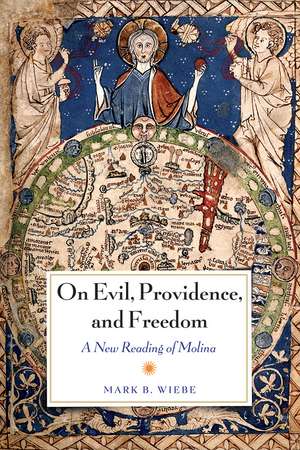On Evil, Providence, and Freedom: A New Reading of Molina
Autor Mark B. Wiebeen Limba Engleză Hardback – 14 apr 2017
This original study is concerned with the reconciliation of divine providence, grace, and free will. Mark Wiebe explores, develops, and defends Luis de Molina’s work in these areas, and bridges the main sixteenth-century conversations surrounding Molina’s writings with relevant sets of arguments in contemporary philosophical theology and philosophy of religion. The result fills a gap between theologians and philosophers working in related areas of study and is a unique contribution to the field of analytic theology.
Wiebe begins by sketching the historical and theological context from which Molina’s work emerged in the late sixteenth century. He then lays out Thomas Aquinas’s understanding of God’s nature and activity, as well as his understanding of the relationship between God’s action and creaturely activity. In the face of challenges like the Problem of Evil, Wiebe argues, Molina’s work is a helpful supplement to Aquinas’s thought. Turning to direct consideration of Molina’s work, Wiebe responds to several of the most well-known objections to Molinism. In support of Molina’s understanding of creaturely freedom, he then develops some twentieth-century work in free will philosophy, focusing on the work of thinkers like Austin Farrer, Timothy O’Connor, and Robert Kane. He argues that there are good reasons to defend a restrained version of libertarian or noncompatibilist free will, and also good reasons to believe this sort of freedom obtains among human agents.
Wiebe concludes that a Molinistic revision of Eleonore Stump’s work on the relationship between providence and free will provides a well-rounded, coherent theological option for reconciling divine providence, grace, and free will. This thoughtful study will appeal to theologians and philosophers, as well as educated readers with a basic knowledge of Christian theology.
Wiebe begins by sketching the historical and theological context from which Molina’s work emerged in the late sixteenth century. He then lays out Thomas Aquinas’s understanding of God’s nature and activity, as well as his understanding of the relationship between God’s action and creaturely activity. In the face of challenges like the Problem of Evil, Wiebe argues, Molina’s work is a helpful supplement to Aquinas’s thought. Turning to direct consideration of Molina’s work, Wiebe responds to several of the most well-known objections to Molinism. In support of Molina’s understanding of creaturely freedom, he then develops some twentieth-century work in free will philosophy, focusing on the work of thinkers like Austin Farrer, Timothy O’Connor, and Robert Kane. He argues that there are good reasons to defend a restrained version of libertarian or noncompatibilist free will, and also good reasons to believe this sort of freedom obtains among human agents.
Wiebe concludes that a Molinistic revision of Eleonore Stump’s work on the relationship between providence and free will provides a well-rounded, coherent theological option for reconciling divine providence, grace, and free will. This thoughtful study will appeal to theologians and philosophers, as well as educated readers with a basic knowledge of Christian theology.
Preț: 383.76 lei
Nou
Puncte Express: 576
Preț estimativ în valută:
73.46€ • 79.82$ • 61.74£
73.46€ • 79.82$ • 61.74£
Carte tipărită la comandă
Livrare economică 21 aprilie-05 mai
Preluare comenzi: 021 569.72.76
Specificații
ISBN-13: 9780875807522
ISBN-10: 0875807526
Pagini: 180
Dimensiuni: 152 x 229 x 23 mm
Greutate: 0.41 kg
Ediția:1
Editura: Northern Illinois University Press
Colecția Northern Illinois University Press
ISBN-10: 0875807526
Pagini: 180
Dimensiuni: 152 x 229 x 23 mm
Greutate: 0.41 kg
Ediția:1
Editura: Northern Illinois University Press
Colecția Northern Illinois University Press
Recenzii
"Readers and scholars will continue to wrestle with historical and current debates about Christian providence and human free will. On Evil, Providence, and Freedom will enrich these theological discussions in important directions. Anyone interested in such prominent subjects in the Christian tradition will do well to visit the pages of Wiebe’s work.”
—Reading Religion
“Mark Wiebe has provided a cogent, thoughtful, and thought-provoking restatement of Molinism that responds to its theological and philosophical critics.”
—Ronald Highfield, Pepperdine University
“Not only does this work do justice to the theological and philosophical contours of the topics at hand, it also wonderfully takes up the theological issues in light of recent work in analytic philosophy. Though there are many texts in theology and philosophy that deal with Molina and Molinism, Mark Wiebe’s book surpasses them in terms of showing how the theological and philosophical issues intersect.”
—Frederick D. Aquino, author of An Integrative Habit of Mind: John Henry Newman on the Path to Wisdom (NIU Press, 2012)
—Reading Religion
“Mark Wiebe has provided a cogent, thoughtful, and thought-provoking restatement of Molinism that responds to its theological and philosophical critics.”
—Ronald Highfield, Pepperdine University
“Not only does this work do justice to the theological and philosophical contours of the topics at hand, it also wonderfully takes up the theological issues in light of recent work in analytic philosophy. Though there are many texts in theology and philosophy that deal with Molina and Molinism, Mark Wiebe’s book surpasses them in terms of showing how the theological and philosophical issues intersect.”
—Frederick D. Aquino, author of An Integrative Habit of Mind: John Henry Newman on the Path to Wisdom (NIU Press, 2012)
Notă biografică
Mark B. Wiebe is assistant professor of theology and church history at Lubbock Christian University in Lubbock, Texas.
